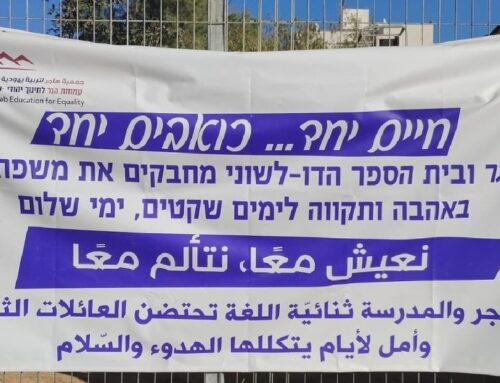Several months ago I was approached by friends at Theater J about a political/historical problem they saw coming down the road. Readers of this blog know I have a particular interest in the historical narratives of Israelis and Palestinians. Theater J was planning to stage a play by Israeli playwright Motti Lerner, entitled “The Admission,” based on allegations of a massacre by Israeli troops in the Palestinian village of Tantura in May 1948, i.e., during what Israelis call their War of Independence and Palestinians call their Nakba (catastrophe). I was familiar with the background of the story, which had received considerable publicity during the late 1990s, when I was living in Israel. The controversy then was set off by a doctoral dissertation written by an Israeli named Teddy Katz, under the supervision of Prof. Ilan Pappe, who has become well-known as probably the most radical of the “Revisionist” (or “New”) Israeli historians, who used newly-released documents to give a different picture of Israeli history, one that is closer to the traditional Palestinian narrative of 1948, and which is offensive to many Jewish Israelis. Other wrinkles in the case are noted in the documents linked below.
Motti’s play was a clearly fictionalized version of the story and could hardly be otherwise, since good theater is never good history because of the very different natures of the two genres. On the other hand, raising an issue like this is irresponsible if there isn’t a very good reason to believe the allegations are likely to have some truth. I was familiar enough with the story to have the impression that there was serious historical research backing up Katz’s charges, and some quick research confirmed my impression.
Please note that I was not and am not confirming these massacre allegations. I haven’t researched the sources themselves or read many of the the most important writings on Tantura. However, I looked at what several highly respected historians, most notably Prof. Benny Morris, have said, and the reports of the dispute over Katz’s dissertation, and it became clear that, at the least, there was (and is) good reason to strongly suspect that a massacre of some sort had occurred at Tantura in 1948. In other words, a play giving that perspective is not an anti-Israel allegation, but rather a correct representation of the current state of historical knowledge by reputable Israeli historians.
Somewhat earlier than we expected, this controversy hit the proverbial fan. A group called COPMA (“Citizens Opposed to Propaganda Masquerading as Art”) published a rather vicious attack on Theater J and its director, Ari Roth, claiming that the play repeats an allegation that has been proved false, and urging readers to stop contributions to the Jewish community institutions that support Theater J. I wrote a response, showing that there is plenty of reason to believe the allegations have a lot of truth, and there is absolutely nothing “anti-Israel” about discussing a controversy that concerns a major issue in Israeli history. That article explains my reasoning. I relied substantially on an article in the Jerusalem Report by none other than Benny Morris. COPMA published a response in which it claimed, among a lot of other questionable assertions, that I had provided “no basis at all” for believing the massacre “may actually have been true.” I’ll leave it to the interested reader as to whether or not I’ve provided such evidence or not. Prof. Morris’s article is very clear on that point.
The upshot to date is that the DCJCC has changed its plans and now will present this spring a 16-performance workshop on the play and a moderated discussion, which will include the author, Motti Lerner, and others. The controversy is discussed at some length in an article in the Forward. Obviously, this argument will continue.
This is just one of the recent controversies about what it means to be pro-Israel, and I think this issue needs to be pushed harder. Even the Forward article referenced above is headlined “Pro-Israel critics Pressure Washington D.C. Troupe,” obviously implying that those being pressured are something other than pro-Israel. The Forward is generally a fair and reputable newspaper but its headline writers might consider the implications of easy and erroneous labeling in cases like this, where pro-Israel attacks pro-Israel.
This circling of the wagons in the “pro-Israel” camp and the exclusion of unwelcome ideas is nothing new. It has often been remarked that the space for dissent and discussion of Israel is appreciably greater in Israel than it is in this country. That does not have to be the case. It is essential that the mainstream of the American Jewish community register its anger that a radical minority on the far right is attempting to distort Israeli reality, to read liberal attitudes out of the community, and to censor what can be seen in a Jewish community setting. I look forward to the workshops Theater J is planning as an opportunity to expand the discussion.






yes